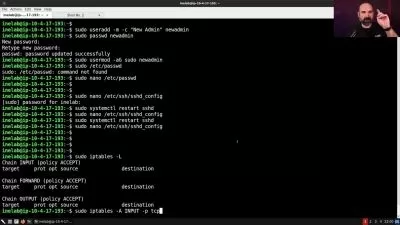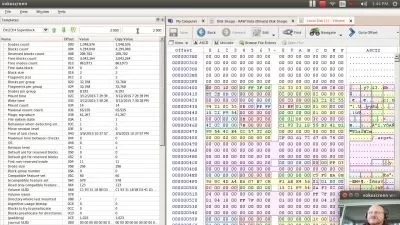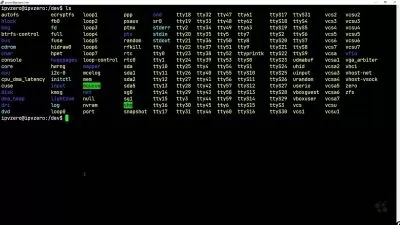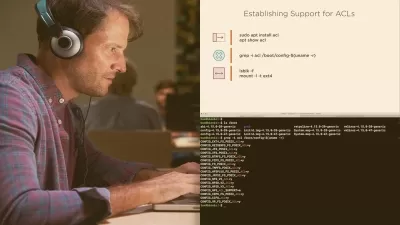Embedded Linux using Yocto Part 4
Linux Trainer
4:30:24
Description
Learn Yocto Project in Deep - SState-Cache, Kernel Recipes, Package Groups
What You'll Learn?
- Internals of shared state cache
- bitbake-dumpsig, bitbake-diffsigs
Who is this for?
What You Need to Know?
More details
DescriptionLearn the below concepts by enrolling in this course
 What is clean build
What is incremental build
Example of clean and incremental build
Shared State Cache (sstate-cache)
Build performance with and without sstate-cache
Tasks in Yocto
 What's the benefit of per-task over per-recipe approach
How does shared state cache works (checksum/signatures and setscene)
Commands: bitbake-dumpsig, bitbake-diffsigs
 SSTATE_DIR variable
 Bitbake Clean tasks: clean, cleanall, cleansstate
What happens when you say bitbake target
PROVIDES list and what's the benefit of PROVIDES list
Bitbake namespaces: recipe names (build time targets) and package names (run time targets)
RPROVIDES , virtual targets and PREFERRED_PROVIDER
How to select a recipe when multiple recipe of same name and different version exists
Yocto Linux Kernel Development (kernel source, configuration, patches)
Linux Kernel Recipes in Yocto (PREFERRED_PROVIDER/PREFERRED_VERSION)
Creating a new kernel recipe in Yocto
Kernel customizations (changing kernel configuration - savedefconfig)
Kernel recipe with source code on git repository
Patching the Linux Kernel
Yocto Linux Kernel Recipes
Modifying an existing kernel recipe (configuration fragments, patch, diffconfig, LINUX_VERSION_EXTENSION)
Using an in-tree defconfig file (KBUILD_DEFCONFIG_KMACHINE)
Difference between general kernel and yocto kernel repository
What is Package group
Difference between package group recipes and normal recipes
Writing a package group recipe (RDEPENDS, RRECOMMENDS, BAD_RECOMMENDATIONS, NO_RECCOMENDS, PACKAGE_EXCLUDE)
Recipes for out of tree modules (module.bbclass)
Automatically load modules on boot
This course comes with a 30 day money back guaranteed!. If you are not satisfied with the course, you'll get your money back
So what are you waiting for, enroll now and take the next step in increasing your Yocto Knowledge
Who this course is for:
- Developers who want to learn Yocto in deep
Learn the below concepts by enrolling in this course
 What is clean build
What is incremental build
Example of clean and incremental build
Shared State Cache (sstate-cache)
Build performance with and without sstate-cache
Tasks in Yocto
 What's the benefit of per-task over per-recipe approach
How does shared state cache works (checksum/signatures and setscene)
Commands: bitbake-dumpsig, bitbake-diffsigs
 SSTATE_DIR variable
 Bitbake Clean tasks: clean, cleanall, cleansstate
What happens when you say bitbake target
PROVIDES list and what's the benefit of PROVIDES list
Bitbake namespaces: recipe names (build time targets) and package names (run time targets)
RPROVIDES , virtual targets and PREFERRED_PROVIDER
How to select a recipe when multiple recipe of same name and different version exists
Yocto Linux Kernel Development (kernel source, configuration, patches)
Linux Kernel Recipes in Yocto (PREFERRED_PROVIDER/PREFERRED_VERSION)
Creating a new kernel recipe in Yocto
Kernel customizations (changing kernel configuration - savedefconfig)
Kernel recipe with source code on git repository
Patching the Linux Kernel
Yocto Linux Kernel Recipes
Modifying an existing kernel recipe (configuration fragments, patch, diffconfig, LINUX_VERSION_EXTENSION)
Using an in-tree defconfig file (KBUILD_DEFCONFIG_KMACHINE)
Difference between general kernel and yocto kernel repository
What is Package group
Difference between package group recipes and normal recipes
Writing a package group recipe (RDEPENDS, RRECOMMENDS, BAD_RECOMMENDATIONS, NO_RECCOMENDS, PACKAGE_EXCLUDE)
Recipes for out of tree modules (module.bbclass)
Automatically load modules on boot
This course comes with a 30 day money back guaranteed!. If you are not satisfied with the course, you'll get your money back
So what are you waiting for, enroll now and take the next step in increasing your Yocto Knowledge
Who this course is for:
- Developers who want to learn Yocto in deep
User Reviews
Rating
Linux Trainer
Instructor's Courses
Udemy
View courses Udemy- language english
- Training sessions 50
- duration 4:30:24
- English subtitles has
- Release Date 2023/08/25













